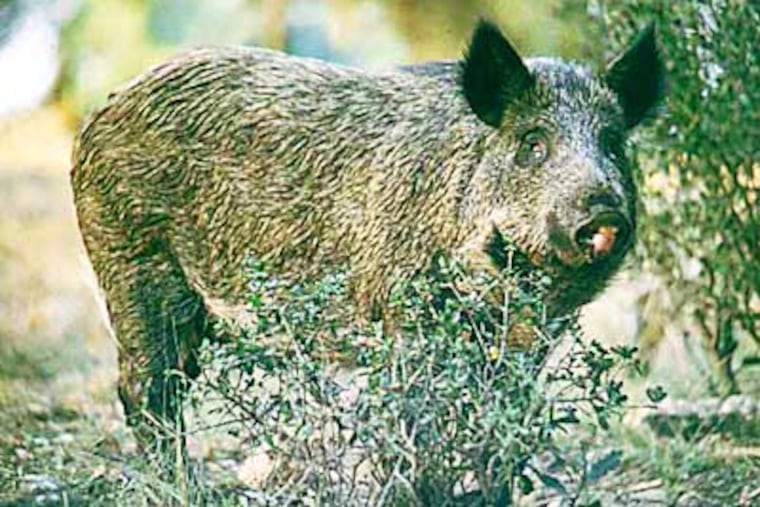Farmers aren't high on these hogs
Feral swine have proved a damaging invasive species.

Tom Barkman, a Bedford County dairy farmer, got a shock one morning a few years ago when a 15-acre section of his just-planted cornfield was ripped to shreds, the seeds gone.
The culprits, he would soon find out: a group, or sounder, of feral swine, 300-pound crop consumers that destroy most everything in their path.
They were escapees, he believed, from a neighboring game-hunting preserve.
So Barkman, who owns 600 acres in Clearview, 100 miles southeast of Pittsburgh, replanted the field - not once but two more times, before grabbing his shotgun and finally staking out his field.
"There was a gob of them, maybe 30," said Barkman, who managed to shoot two.
He never again had a problem with crop damage. But he soon had something else to worry about: the well-being of his livestock.
He began noticing a suspicious number of deaths among his dairy calves and figured their killers were the feral hogs. He was so fearful he shipped the calves to another farm to be raised.
About six years ago, the Pennsylvania Game Commission declared war on feral swine - also known as wild boar or feral pigs - calling for the eradication of the imported, and invasive, species.
But so far, hunting and trapping efforts have not eliminated the boars in the wild. So the game commission wants to go a step further and ban the importation and possession of the animals.
"We feel we have done a good job working with hunters and trappers to contain the population," game commission spokesman Gerald Feaser said. "But we are trying to manage it to the point where we can eradicate them in the wild, so stopping people from importing and possessing them in the first place is the way to do that."
The commission published a proposal in last week's Pennsylvania Bulletin asking the public for comments on the proposal. If the policy is approved, either by the commission or executive order, importation of wild boar would be illegal 30 days after it takes effect and possession of feral hogs would be banned a year later.
At least one other state, Michigan, has banned so-called captive wild hog hunts; other states, such as New York, are considering similar bans.
Feral swine have been found in at least 14 counties in Pennsylvania and at least 40 other states from Oregon to New York. They likely are a combination of the offspring of escaped domesticated livestock and Eurasian boar imported by hunting ranches that were either released or broke free from their fenced enclosures.
To be sure, these are not the pink porkers made famous in E.B. White's classic children's story Charlotte's Web or the film Babe. They are large, hairy omnivores with menacing tusks, and have been known to break through electric wire fences and gobble up everything from ground-nesting bird eggs to fawns.
Intelligent and prolific breeders (litters number from four to 13 piglets) with no known predators, the hogs, once established, dig up crops, destroy native plants, and pose a hazard to indigenous species.
No population statistics or records are kept on numbers of hogs killed in Pennsylvania, according to the game commission. Nor are there many anecdotal reports of encounters with them.
There was one report in 2004 of a woman in Carbon County being chased by four pigs as she drove in her golf cart.
The problem is most acute in Texas, where as many as two million feral swine roam. Texas also supports a busy hog-hunting culture.
Residents of Gloucester County were surprised in 2008 to learn that as many as 100 hogs were rampaging over golf courses there. A hog-hunting season in the state has helped control the population.
In Pennsylvania, hogs are hunted for sport on at least 15 fenced-in game preserves - also known as captive or "canned hunts" by those who oppose shooting animals that cannot escape.
The proposal to end boar ownership does not sit well with Larry Lint, owner of the Pig Farm in Butler County in northwestern Pennsylvania.
Lint says he has spent millions over 15 years raising his Eurasian pigs - originally imported from Europe and Russia - for meat and hunting. People pay $675 to shoot "trophy" hogs on Lint's preserve.
He says he's licensed by the Department of Agriculture, gets inspected regularly, and complies with all regulations.
"I raise pigs on a farm. How can the game commission say we can't keep them?" an astonished Lint said when he learned of the news. "I'm killing myself to make a living to promote this business and sell animals."
He said his pigs had never escaped and thought the problem was exaggerated.
But the proposal has won the support of the Humane Society of the United States.
Though the group would like to see the elimination of all canned hunts, it favors humane measures to control non-native wildlife.
Andrew Page, senior director of wildlife abuse and fur campaigns for the Humane Society of the United States, said it ought to be illegal to possess and propagate introduced species such as hogs.
"It's wise to head off the issue at the source: those who breed them," he said, adding that the society opposed what it considered inhumane methods used in other states to track and kill pigs, such as helicopters or dogs.
Lint said putting him out of business would hurt the economy around rural Parker, which depends on the traffic his farm brings in.
"We support the taxidermists, the hotels, the grocery stores," he said. "We haven't done anything to hurt anyone."
The game commission's Feaser cautions that the discussion process is only beginning.
"This is not written in stone," he said. "He's free to offer his comments, and will be taken into consideration. At this point, we don't know what course we will take."
at 717-783-2584, aworden@phillynews.com, or follow @inkyamy on Twitter.